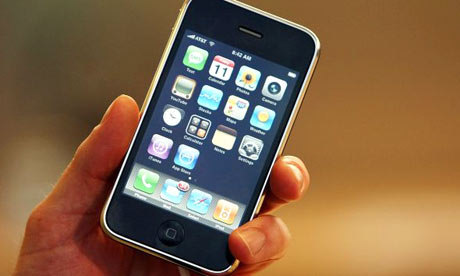
Britain's legion of smartphone users may have to watch their iPhone or BlackBerry become potentially useless as the UK's mobile phone networks face a potential "capacity crunch".
This week's expected call of a general election may send plans to liberalise the UK airwaves back to the drawing board and deprive an incoming government of the early windfall it could have bagged by selling off the old analogue television signal next year.
It could also leave the newly merged Orange and T-Mobile in limbo while management wait to see whether they can use their existing mobile phone spectrum for the next generation of super-fast mobile phone technologies – known as "long term evolution" or LTE.
Any delay to the liberalisation of the airwaves or sale of a new spectrum would leave mobile phone operators with a serious headache. Last year, according to Ofcom, mobile data traffic increased 200% and some networks – most notably O2 in London – are creaking under the strain. They need more capacity so users of smartphones that can access the web or download applications do not see their connections slow down or fail.
After almost five years of wrangling, the mobile phone industry, Ofcom and the government's own spectrum adviser Kip Meek last year thrashed out a deal that would allow the mobile phone companies to use their existing spectrum for mobile broadband services. It involved caps on the amount of wireless spectrum they could own but did allow them to take part in an auction of a further spectrum – including the old analogue TV signal – planned for next year. While that auction was not expected to raise anything like the £22.5bn that the original 3G spectrum sale earned back in 2000, it would still have raised hundreds of millions, possibly even a few billion pounds.
The plan was complicated by the merger of Orange and T-Mobile, but in order to avoid a lengthy competition inquiry the two companies agreed to sell a quarter of the spectrum they were granted in the 1990s for voice and text services.
The deal, which required Lord Mandelson's personal intervention, also included extending indefinitely the 20-year licences that the mobile phone companies picked up in the dotcom boom for so-called 3G mobile data services. In fact it emerged last week that one UK operator – 3 – has already factored the extension of its 3G licence into its financial figures.
The whole spectrum package has been working its way through parliament as a statutory instrument that instructs Ofcom to implement Kip Meek's plan. It has progressed alongside the controversial passage of the Digital Economy Bill which includes provisions for punishing persistent unlawful internet file-sharers by severing their broadband connections.
If Gordon Brown calls a general election tomorrow, as widely anticipated, the digital economy bill is likely to be pushed into law in the so-called wash-up of legislation that will occur this week. In order for it to become law, however, the statutory instrument needs to be debated and voted upon in the House of Commons and the House of Lords.
The party whips are understood to have given the instrument time in the House of Commons but no such provision has been made in the Lords. "It looks very, very precarious," said one mobile phone industry insider last night. "If it does not get through there is every likelihood that a new government will review the whole matter again, delaying the process for a year, perhaps more."
Even if it does go through, BT is understood to be considering legal action against plans to extend the networks' 3G licences, having already sent a strongly worded letter to Lord Mandelson about what it sees as an unjustifiable subsidy for the mobile phone industry.
Despite the potential capacity crunch, O2 and Vodafone are actually likely to welcome any delay in the process of implementing the statutory instrument. They believe the merged Orange and T-Mobile will still have too much spectrum. Orange and T-Mobile, however, will be dismayed at any delay to the liberalisation of spectrum. There has been speculation recently that the two companies want to use the capacity they were given when they started operating in the 1990s for LTE services. They would be the first UK network to run LTE services.

